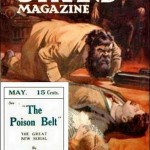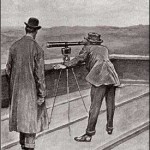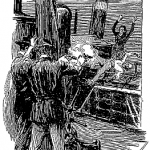“That’s an ugly word,” Ezra remonstrated. “This ‘report’ we will say.
A report may be either true or false, you know.”
“And by this report, thin,” the major continued, “you reckon that the market will be so affected that your father and you will be able to buy and sell in a manner that will be profitable to you, but by which you will do other people out of their money?”
“You have an unpleasant way of putting it,” said Ezra, with a forced laugh; “but you have the idea right.”
“I have another idea as well,” roared the old soldier, flushing purple with passion. “I’ve an idea that if I was twinty years younger I’d see whether you’d fit through that window, Master Girdlestone. Ged! I’d have taught you to propose such a schame to a man with blue blood in his veins, you scounthrel!”
Ezra fell back in his chair. He was outwardly composed, but there was a dangerous glitter in his eye, and his face had turned from a healthy olive to a dull yellow tint.
“You won’t do it?” he gasped.
“Do it! D’ye think that a man who’s worn Her Majesty’s scarlet jacket for twinty years would dirty his hands with such a trick? I tell ye, I wouldn’t do it for all the money that iver was coined. Look here, Girdlestone, I know you, but, by the Lord, you don’t know me!”
The young merchant sat silently in his chair, with the same livid colour upon his face and savage expression in his eyes. Major Tobias Clutterbuck stood at the end of the table, stooping forward so as to lean his hands upon it, with his eyes protuberant and his scanty grey fringe in a bristle with indignation.
“What right had you to come to me with such a proposal? I don’t set up for being a saint, Lord knows, but, be George! I’ve some morals, such as they are, and I mean to stick to them. One of me rules of life has been niver to know a blackgaird, and so, me young friend, from this day forth you and I go on our own roads. Ged! I’m not particular, but ‘you must draw the line somewhere,’ as me frind, Charlie Monteith, of the Indian Horse, used to say I when he cut his father-in-law. I draw it at you.”
While the major was solemnly delivering himself of these sentiments, Ezra continued to sit watching him in a particularly venomous manner. His straight, cruel lips were blanched with passion, and the veins stood out upon his forehead. The young man was a famous amateur bruiser, and could fight a round with any professional in London. The old soldier would be a child in his hands. As the latter picked up his hat preparatory to leaving the room, Ezra rose and bolted the door upon the inside. “It’s worth five pounds in a police court,” he muttered to himself, and knotting up his great hands, which glittered with rings, he approached his companion with his head sunk upon his breast, his eyes flashing from under his dark brows, and the slow, stealthy step of a beast of prey. There was a characteristic refinement of cruelty about his attack, as though he wished to gloat over the helplessness of his victim, and give him time to realize his position before he set upon him.
If such were his intention he failed signally in producing the desired effect. The instant the major perceived his manoeuvre he pulled himself up to his full height, as he might have done on parade, and slipping his hand beneath the tails of his frock-coat, produced a small glittering implement, which he levelled straight at the young merchant’s head.
“A revolver!” Ezra gasped, staggering back.
“No, a derringer,” said the veteran blandly. “I got into the thrick of carrying one when I was in Colorado, and I have stuck to it ever since. You niver know when it may be useful.” As he spoke he continued to hold the black muzzle of his pistol in a dead line with the centre of the young man’s forehead, and to follow the latter’s movements with a hand which was as steady as a rock. Ezra was no coward, but he ceased his advance and stood irresolute.
“Now, thin,” cried the major, in sharp military accents, “undo that door.”
The young merchant took one look at the threatening apoplectic face of his antagonist, and another at the ugly black spot which covered him. He stooped, and pushed back the bolt.
“Now, open it! Ged, if you don’t look alive I’ll have to blow a hole in you afther all. You wouldn’t be the first man I’ve killed, nor the last maybe.”
Ezra opened the door precipitately.
“Now walk before me into the strate.”
It struck the waiters at Nelson’s well-known restaurant as a somewhat curious thing that their two customers should walk out with such very grave faces and in so unsociable a manner. “C’est la froideur Anglaise!” remarked little Alphonse Lefanue to a fellow exile as they paused in the laying of tables to observe the phenomenon. Neither of them noticed that the stout gentleman behind with his hand placed jauntily in the breast of his coat, was still clutching the brown handle of a pistol.
There was a hansom standing at the door and Major Clutterbuck stepped into it.
“Look ye here, Girdlestone,” he said, as the latter stood looking sulkily up and down the street. “You should learn a lesson from this. Never attack a man unless you’re sure that he’s unarmed. You may git shot, if you do.”
Ezra continued to stare gloomily into vacancy and took no notice of his late companion’s remark.
“Another thing,” said the major. “You must niver take it for granted that every man you mate is as great a blackgaird as yourself.”
The young merchant gave him a malignant glance from his dark eyes and was turning to go, but the gentleman in the cab stretched out his hand to detain him.
“One more lesson,” he said. “Never funk a pistol unless you are sure there’s a carthridge inside. Mine hadn’t. Drive on, cabby!” With which parting shot the gallant major rattled away down Piccadilly with a fixed determination never again to leave his rooms without a few of Eley’s No 4 central fires in his pocket.




